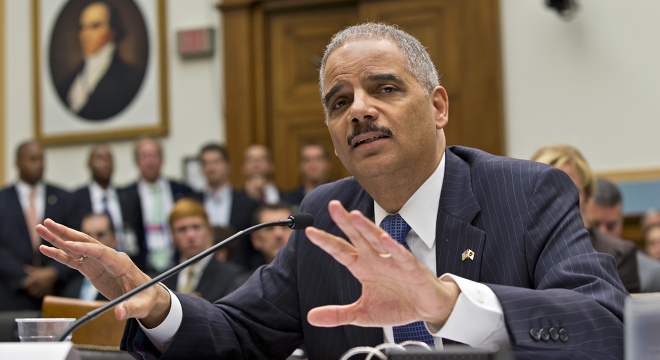Attorney General Eric Holder on Tuesday announced that he had ordered a criminal investigation into the IRS scandal, in which the agency was found to have inappropriately screened and handled applications for tax-exempt status from conservative groups.
“The FBI is coordinating with the Justice Department to see if any laws were broken in connection with those matters related to the IRS,” Holder said at a press conference Tuesday afternoon. “We are examining the facts to see if there were criminal violations.”
The question then became what laws, specifically, investigators would look at. At a Congressional hearing on Wednesday, Holder gave a few more hints, telling lawmakers that the Justice Department was looking at possible “criminal violations of civil rights statutes” as well as any false statements that may have been made, presumably by IRS officials. Holder also mentioned the Hatch Act, which limits the political activity of government employees. While not criminal, Hatch Act violations can result in firings or suspensions.
To try to get a better sense of what investigators will focus on, TPM spoke on Wednesday with two former officials and a tax law professor. Here’s one thing they suggested: if you’re looking for criminal violations, you’re probably going to have to look beyond the report released by the Treasury Inspector General for Tax Administration on Tuesday.
Nathan Hochman, a former assistant attorney general for the tax division of the Justice Department, and currently a partner at the law firm Bingham McCutchen, said it was telling that the report did not refer any of its findings to the Justice Department.
“Generally, the [Inspector General] is not shy if they find clear-cut violations of criminal law to recommend that the Department of Justice investigate them and refer them for criminal investigation,” Hochman told TPM. “The fact that you don’t see that here suggests that, at least in the IG’s mind … the level of conduct didn’t rise to that level of violation.”
That said, the report is not the last word on the story, and federal investigators have many more tools at their disposal than the IG investigators did.
“For instance, the Department of Justice can convene a grand jury to look at this issue, issue grand jury subpoenas, bring people in front of the grand jury to give testimony under penalty of perjury,” Hochman said. “They have the ability, if necessary, to offer immunity, for testimony that the IG couldn’t.”
According to Hochman, a civil rights case in this context would be unusual, even though Holder mentioned the possibility on Wednesday.
“I’ve never seen, at least recently, this statute be used where the civil rights being violated are your First Amendment rights … probably right of association being the number one here,” Hochman said. “Even if they were singled out for this additional scrutiny, the question will be, well, does that constitute, at a criminal level, a violation of your First Amendment rights?”
It’s not just the government’s lawyers that will be interested in possible civil rights violations. Ellen Aprill, a professor at Loyola Law School, said that while political motive is absent from the IG report, if it could be proved, the wronged organizations could bring their own action.
“I actually don’t think the report shows that there was political animus and they were out to just get the right-wing groups, because it was only a small fraction of the groups that got these long letters,” Aprill told TPM. “But if they could show it, then I guess [the groups] could try to bring a Bivens action for violation of their civil rights.” (A Bivens action is a way for victims of constitutional violations to sue the government.)
With what is known right now, there appear to be at least two more areas of interest, both of which fall outside the scope of the IG report. The first is the IRS’ release late last year of pending confidential applications to the news outlet ProPublica. Applications for tax-exempt status normally become public after groups are approved. But until then, they are supposed to remain secret. For reasons still unknown, that’s not what happened for nine groups whose materials were sent to ProPublica.
“It’s not in the report at all, but that’s the only place that I can imagine Eric Holder would have a hook for bringing criminal prosecution against anybody in the IRS in this whole affair,” Philip Hackney, an assistant professor of law at Louisiana State University and a former senior technician reviewer in the the IRS’ Office of Chief Counsel, told TPM.
Disclosing taxpayer information is a very serious offense for an IRS agent.
“That’s like the one-way ticket to the crowbar Hilton in the IRS,” Hackney said.
The other area that might be looked at, as Holder mentioned on Wednesday, is false statements made by IRS officials.
“They’re going to look at the statements that were made by the IRS, particularly to Congress, and determine whether or not any false statements were made,” Hochman said. “Which at the criminal level it’s a pretty detailed look at both the actual statement that was made, and the question to which it was responding to, or the context in which it was given.”






